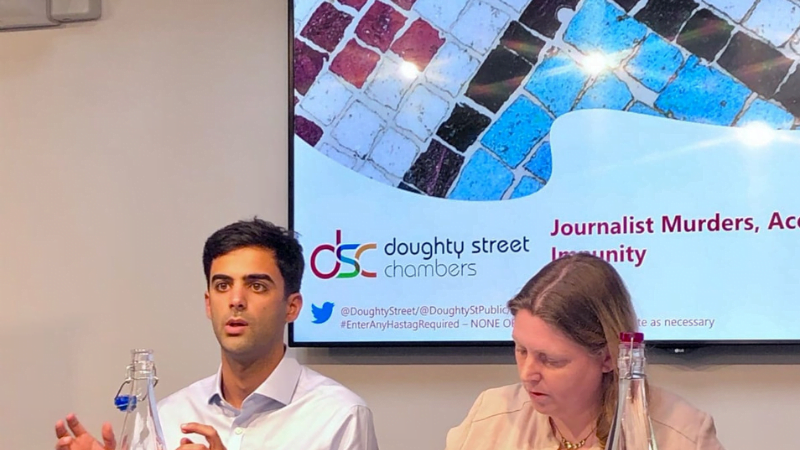There has been “no meaningful change” in the way that journalists in Malta are harrassed after the assassination of Daphne Caruana Galizia, according to a panel discussion hosted by London law firm Doughty Street Chambers on Tuesday.
Paul Caruana Galizia, the son of the late journalist, spoke of the need for proper accounting of the decades of harassment, abuse and violence, not just the murder, of his mother. The debate on ‘Journalist Murders, Accountability, and Impunity’ focused on State responsibility and the duty to protect life.
Caruana Galizia was joined by UN Special Rapporteur Agnes Callamard, Doughty Street Barrister Caoilfhionn Gallagher and Tony Murphy from Bhatt Murphy Solicitors, representing the family.
The event was organised ahead of the two-day Global Conference for Media Freedom in London starting on Wednesday. The event will bring together over 1,000 guests, including government ministers and officials, the diplomatic community, international agencies, journalists, civil society, and academics. It will examine the challenges facing media freedom and opportunities for a safer environment for journalists.
Gallagher raised the issue of the harassment of The Shift News founder and editor, Caroline Muscat. She laid out the State’s obligation to respond and react to them appropriately.
.@caoilfhionnanna raises concern about the threats to @muscatcar in #Malta after the murder of #DaphneCaruanaGalizia. @AgnesCallamard uses her case to highlight the need for setting our clearly state obligations to respond to these threats #DefendMediaFreedom
— Doughty Street International (@DoughtyStIntl) July 9, 2019
Gallagher had raised the inadequacy of the investigations into the assassination of Caruana Galizia before the UK parliament. She has argued for the need for an independent public inquiry, even at the Council of Europe in the lead up to a resolution that set a three-month deadline for its launch.
Parallels emerged on the impunity surrounding the murder of journalist Jamal Khashoggi and that of Caruana Galizia, during the debate that also included lawyer Mark Stephens CBE and Simon Spanswick the CEO of the Association of International Broadcasters.
The UN Rapporteur suggested the need for “standing international instruments” that would provide an automatic and international response to the murder of a journalist. Callamard added there was a “democracy deficit” between what States were prepared to do and what citizens were demanding when it came to accountability for murdered journalists.
Reporters Without Borders UK Bureau Director Rebecca Vincent highlighted the fact that three European journalists have been murdered in the EU within the last 12 months. Murphy added that international mechanisms were necessary as well as “effective inquest mechanisms” domestically.
He added that in the case of Malta and Caruana Galizia’s assassination, the mechanisms to deal with such cases were already there. “All we are asking is that Malta complies with existing laws,” he said.
Gallagher paid tribute to Caruana Galizia’s three sons, Matthew, Paul, and Andrew, for their work in “seeking truth and justice for their mother’s murder in Malta.”
At @DoughtyStPublic, @pcaruanagalizia speaks on the assassination of his mother, journalist #DaphneCaruanaGalizia. Picking up on @AgnesCallamard’s point about state accountability, he emphasises the need for a public inquiry in light of institutional failings in #Malta. pic.twitter.com/Fu1TSNRGeV
— Rebecca Vincent (@rebecca_vincent) July 9, 2019
Paul Caruana Galizia explained the details of his family’s campaign for the Maltese government to launch an independent public inquiry into his mother’s assassination. The UN, the European Parliament and, most recently, the Council of Europe have all reiterated the call for such an inquiry. The government has so far refused.
The Daphne Caruana Galizia Foundation has launched a website with a countdown to the three-month deadline, reminding the government it was “time to do its job”.












